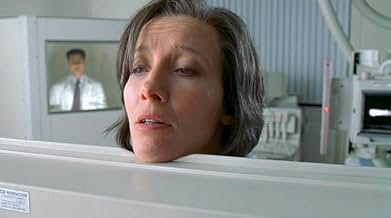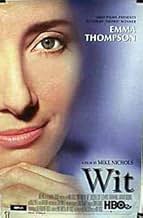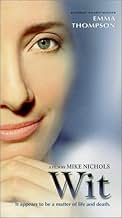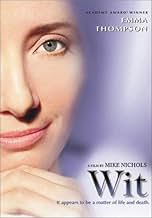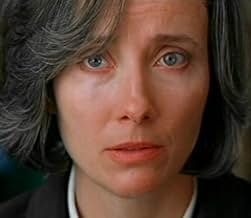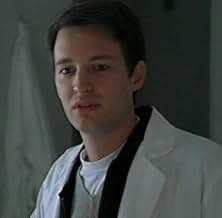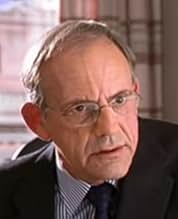A renowned professor is forced to reassess her life when she is diagnosed with terminal ovarian cancer.A renowned professor is forced to reassess her life when she is diagnosed with terminal ovarian cancer.A renowned professor is forced to reassess her life when she is diagnosed with terminal ovarian cancer.
- Director
- Writers
- Stars
- Won 3 Primetime Emmys
- 13 wins & 21 nominations total
- Nurse
- (as Su-Lin Looi)
- Fellow 1
- (as Harry Dillon)
- Director
- Writers
- All cast & crew
- Production, box office & more at IMDbPro
Featured reviews
We are given a look into life and death from the point of view of a poetry scholar who has, in turn, viewed life and death in the abstract through John Donne's poetry. She, in turn, is viewed in the abstract by a renowned doctor who views life and death as a case in a bed and by the scholar's former student who doesn't know how to communicate with patients beyond superficial catch phrases.
This is a touching, powerfully filmed play guided by the witty, amusing, profound, and painful asides and soliloquies of the main character. Her only human contact seems to be through the compassionate nurse, the scholar's old teacher, and the audience -- the point being that we too often live our lives inside walled prisons of our own construction and then come to the end realizing that we had never lived at all.
The movie could easily have descended into melodrama but instead is gritty, prim, and gripping in its own odd way. See this one if you can.
Six years ago I invited the ten medical students in my history taking group to view the film together in a setting away from the school. I have since repeated this twice yearly with each of the small groups under my charge. I made one big mistake the first year. After the movie ended I turned on the lights while the credits were running, oblivious to the sniffing and outright weeping on the part of the freshman medical students. Since then I've permitted the credits to run completely before turning on the lights. There is generally a delay of up to five minutes before any of them are able to say anything.
The student response has been uniform. Gratitude for having seen the film, awe of the realities of the profession they have chosen to enter and appreciation for the chance to come to a deeper understanding of their own selves and motivations for entering medical school.
Eileen Atkins is absolutely superb as Evelyn Ashford, PhD. Her scenes are brief but they bring the deeply religious underpinnings of the film to the fore. Her first scene, in which she recites the final stanza of Donne's Holy Sonnett X, (a scene which gave the movie its title) contrasts with the tender love in Vivian's hospital room. Her reciting of the poetry is astonishing. It was not until the sixth or so viewing (I've lost count) that I realized her parting words, "May the angels lead you to Paradise. . . " were the English translation of In Paradisum from the Roman Catholic funeral liturgy. That was one time when my tears joined the students.
Anyone working in medicine; students, residents, nurses and nursing students, aides and so on, should watch this movie. I generally used the class the day following the viewing for a discussion of the movie, the bedside manner of the docs, nurses, techs and so on as well as what feelings the movie stirred in them. The conversations have been memorable.
This is a movie that is not to be missed. It is tragic that it was made for television by HBO rather than given general theatrical release. Many fewer people have seen it is a result.
Did you know
- TriviaThis movie is often shown at medical colleges as an example of how doctors and researchers should not behave.
- GoofsDuring her exam with the young internist, her arms alternate repeatedly from being completely under the sheet, to being folded together on top of the sheet.
- Quotes
E.M. Ashford: Do you think that the punctuation of the last line of this sonnet is merely an insignificant detail? The sonnet begins with a valiant struggle with Death calling on all the forces of intellect and drama to vanquish the enemy. But it is ultimately about overcoming the seemingly insuperable barriers separating life death and eternal life. In the edition you choose, this profoundly simple meaning is sacrificed to hysterical punctuation.
E.M. Ashford: And Death, Capital D, shall be no more, semi-colon. Death, Capital D comma, thou shalt die, exclamation mark!
E.M. Ashford: If you go in for this sort of thing I suggest you take up Shakespeare.
E.M. Ashford: Gardner's edition of the Holy Sonnets returns to the Westmoreland manuscript of 1610, not for sentimental reasons I assure you, but because Helen Gardner is a scholar.
E.M. Ashford: It reads, "And death shall be no more" comma "death, thou shalt die." Nothing but a breath, a comma separates life from life everlasting.
E.M. Ashford: Very simple, really. With the original punctuation restored Death is no longer something to act out on a stage with exclamation marks. It is a comma. A pause.
E.M. Ashford: In this way, the uncompromising way one learns something from the poem, wouldn't you say? Life, death, soul, God, past present. Not insuperable barriers. Not semi-colons. Just a comma.
- SoundtracksSerenade Adagio
String Quartet #15 (2nd Movement)
Written by Dmitri Shostakovich (as Dimitri Shostakovitch)
Performed by The Manhattan String Quartet
Courtesy of Ess.a.y Recordings
Details
- Runtime
- 1h 39m(99 min)
- Color
- Sound mix
- Aspect ratio
- 1.85 : 1


